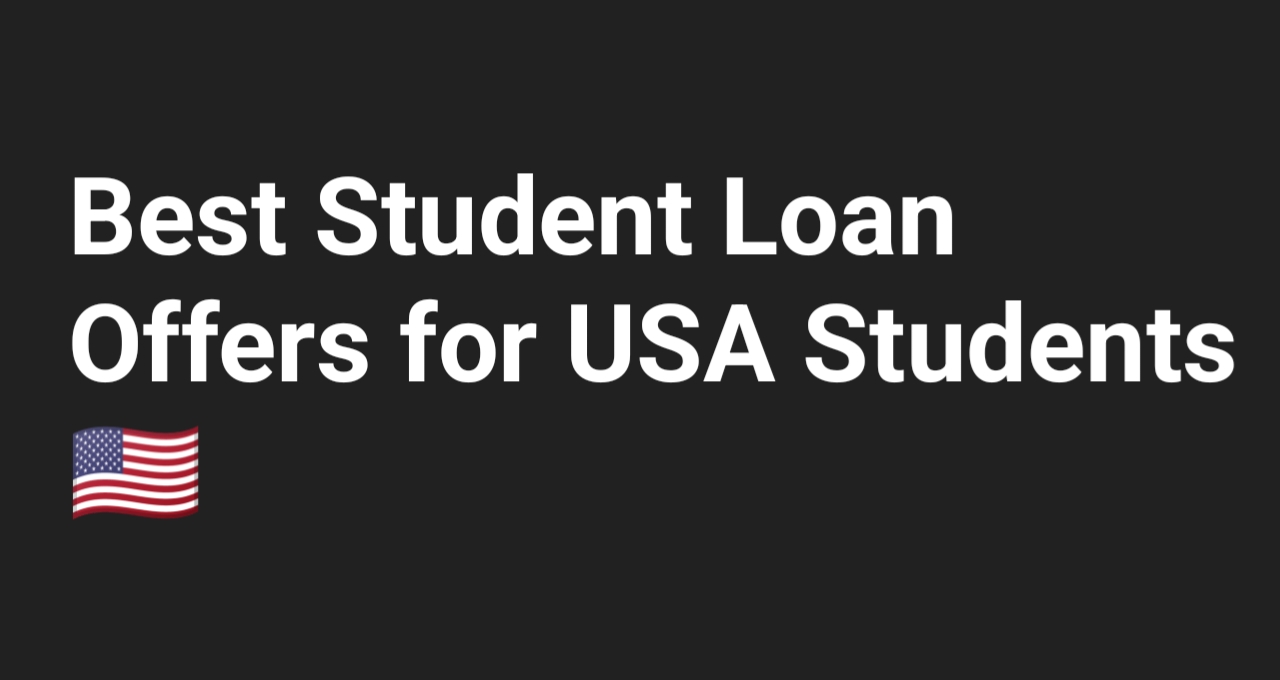Best Student Loan Offers for USA students:
When it comes to financing your education, you have two primary options: federal student loans, managed by the government, and private student loans, offered by banks, credit unions, and online lenders. In this guide, we’ll help you understand the nuances of private student loans, when they make sense, and how to secure the best terms.
Federal vs. Private Student Loans:
Federal student loans are often the preferred choice due to their borrower-friendly terms, including lower interest rates, flexible repayment options, and loan forgiveness programs. They are an excellent first choice for most students.However, private student loans can be a viable option if you’ve already explored federal aid options. Here’s when private loans might be a good fit:
1. FAFSA Completion: If you’ve completed the Free Application for Federal Student Aid (FAFSA) and determined that federal grants and work-study programs aren’t sufficient for your needs.
2. Exhausted Federal Limits: If you’ve maxed out your federal loan limits, both subsidized and unsubsidized.
3. Strong Credit: Having a credit score of 690 or above, or having a co-signer with a solid credit history.
4. Responsible Borrowing: Only borrowing what you can reasonably repay.
Also Read: Stock Market Shock: Better Stock Crashes 90% After IPO Debut
Best Private Student Loan Providers
Below, we’ve compiled a list of some of the best private student loan providers for various student categories:
1. Sallie Mae Undergraduate Student Loan: This is an excellent option for private student loans, especially if you have a credit score in the mid-600s. Interest rates range from 4.50% to 15.49%.
2. College Ave Undergraduate Student Loan: If you’re a part-time student with a credit score in the mid-600s, this lender offers competitive rates between 5.05% and 16.99%.
3. Ascent Credit-based Student Loan: International students with low to mid-600 credit scores can benefit from this lender’s rates, which vary from 4.48% to 15.81%.
Also Read: Ninette Ríos Net Worth
4. Earnest Undergraduate Loan: If you have a credit score of 650, Earnest offers a rate range of 4.45% to 14.90%.
5. SoFi Undergraduate Student Loan: With a minimum credit score requirement in the mid-600s, SoFi provides fixed APRs ranging from 4.44% to 14.70%.
6. Discover Undergraduate Loan: For those with varying credit scores, Discover offers rates from 4.49% to 14.99%.
7. Education Loan Finance Private Student Loan: A credit score of 680 or above can access rates between 4.48% and 12.29%.
8. Funding U Private Student Loan: Even with no minimum credit score, Funding U provides rates ranging from 6.99% to 12.99%.
9. LendKey Private Student Loan: LendKey offers competitive rates for those with a minimum credit score of 660, with rates varying from 4.39% to 11.11%.
Also Read: Anuar Zidan Net Worth
10. Custom Choice Loan: If your credit score is at least 600, Monogram’s Custom Choice Loan features rates between 4.43% and 14.66%.For specific student categories, we also recommend the following:-
International Student: Ascent is a great choice, offering competitive rates for those without co-signers.-
No Co-Signer: If you don’t have a co-signer, Funding U is a viable option.
Graduate School: College Ave Graduate Student Loan and Ascent Graduate and Health Professions Student Loan are top choices.
Part-Time Students: Consider RISLA Private Student Loan or College Ave Undergraduate Student Loan.-
Parent Loan: ISL Private Student Loan is a good choice.
Income-Based Private Loan: For income-based private loans, check out Edly Non-Cosigner Student Loan.
Understanding Private Student Loans
Private student loans differ from federal loans in several key ways:-
Application Process:
To secure federal loans, you complete the FAFSA, while private loans involve applying to banks, credit unions, or online lenders.
Interest Rates: Federal loans have fixed interest rates, set by Congress annually. In contrast, private loans offer fixed or variable rates based on creditworthiness.-
Origination Fees: Federal loans may have origination fees, while private loans often do not.
Borrower Protections: Federal loans offer added benefits, such as income-driven repayment plans and Public Service Loan Forgiveness, which private loans generally lack.
Qualifying for Private Student Loans
Each lender has specific requirements, but typically, they consider your credit score and income. Students often need a co-signer if they lack a credit history. Certain lenders may assess academic performance and earning potential.
Dealing with Bad Credit
Securing a private student loan with poor credit can be challenging. Federal loans don’t require a strong credit history, making them a better option. However, if you must resort to private loans, having a co-signer with excellent credit is essential.
The Application Process
Every lender has its own application process, but you’ll generally need to provide proof of citizenship, identity, income, and school-related information, including the cost of attendance.
Choosing the Right Interest Rate
When exploring private loans, compare offers from various lenders to find the lowest interest rate. Some lenders offer both fixed and variable rates, so consider your preference.
Conclusion
Private student loans can be a valuable resource when used wisely. Before pursuing them, be sure to explore all federal aid options and secure the best terms possible. It’s essential to understand the differences between federal and private loans, qualify for the loan you need, and carefully consider your financial situation to make an informed choice.For more information on private student loans, be sure to research each lender’s terms and conditions. Remember, education is an investment in your future, and the right financial decisions can make a significant difference in your educational journey.
